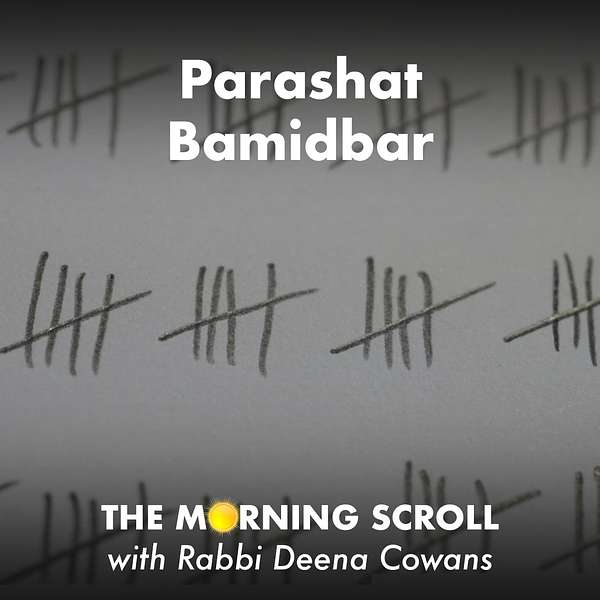
The Morning Scroll
The Morning Scroll
Parashat Bamidbar, June 2nd
Use Left/Right to seek, Home/End to jump to start or end. Hold shift to jump forward or backward.
Could you take a moment to fill out this brief survey to let us know what you think of the show? It would help us out so much!
Speaking of surveys, you know who took a survey? The Israelites in this week's parsha. They took a census of everybody in the tribes. Well, not the Levites. Or women. Or children. What's up with that?
Produced by Mishkan Chicago. Music composed, produced, and performed by Kalman Strauss. See our upcoming Shabbat services and programs here, and follow us on Instagram and like us on Facebook for more updates. Check out Shabbat Replay on Contact Chai for more from Rabbi Deena.
Transcript
Welcome to The Morning Scroll! I'm Rabbi Deena Cowans from Mishkan Chicago and you're listening to what will be a quick dive into this week's parsha. If you’ve been meaning to brush up on your Jewish literacy, or you’re looking for some inspiration, you’ve come to the right place. This week, we read Parashat Bamidbar, “in the desert”, the first parsha in, you guessed it, the book of Bamidbar. We’ll start with a brief recap:
God tells Moses to conduct a census of all men ages 20 and up who can bear arms. God the names one nasi, a sort of prince or head of each tribe, to help with the counting. Then, results are in and there’s… a lot of people. A grand total of 603,000, just the men of military age and not including Levites. The Levites won’t be included in the army, they are basically God’s army, with tasks like shlepping the Mishkan around and guarding all its stuff. This was originally supposed to be the job of the firstborns, but they lost that job when they participated in the Golden Calf. Now that we know who’s at the party, we get the seats at the table, meaning where each tribe camps around the Mishkan- three tribes to each direction, identified by their flags. Moses then gets the command to count all the Levite men ages one month and older, from the three clans of the tribe: Gershon, Kehat and Merari. This number comes to 22,000, and each clan has special jobs and a place to camp too. Turns out God does want to know how many firstborns there are, since the Levites technically replaced them as God’s chosen Temple servants, and when the number comes out to 273 more firstborns than Levites, each of these people gives 5 shekels to the priests and is considered redeemed. We end by learning about the specific duties of the kehati clan of Levites, who help pack and shlep the vessels in the Mishkan when it moves.
Fun fact: 20 years ago, this was my Bat Mitzvah parsha, and I recently rediscovered my dvar Torah, where 13 year old me talked about how important it is to count people so they know that they count, they matter. 33 year old me, reading this, was like, wait, what? This isn’t about counting people so they matter, it’s about knowing our military might. Like, hello, we don’t count the women and children, don’t they matter? Is the only thing we care about what someone’s value is to being productive in society, and how come we don’t value women’s labor? Which makes me pretty much the only BMitzvah student to be more cool about her parsha at 13 than 33.
Ok but seriously. What do we do with the ways labor is, and isn’t, valued in this parsha? One answer comes from Ramban, Rashi’s grandson and a prolific French commentator himself, who looks at this parsha and literally says, “I don’t understand why they do this?” Why does God need to just count humans? And after talking through it for a while, he decides that it cannot possibly be that these emissaries of God just showed up at people’s door with a clipboard and asked how many inside? Rather, Ramban imagines, God tells Moshe to tell the people conducting the census to approach each house with reverence, but to witness the family with awe and reverence and then count them. And goodness, that feels totally different to me. Sure, we might need to know how many people we have for a conquering army as we start to think about entering the land, but taking time to see, really see, each family group with awe and reverence, to recognize that these fighting age men come from a whole family system and each person within it is vital, feels so different.
This week, I want to bless the women whose husbands, brothers, friends were counted to be conscripted, and who might be feeling scared or unseen in that process. I hope they are blessed with a sense of place and belonging, knowing that while they might not be counted, they are seen with awe and reverence, and a valuable place in their community. And to any of you who feel unseen, or undervalued, you matter. So much. I am here to see you, to witness your life, and I hope you feel blessed to be known and recognized in the communities of which you are a part.